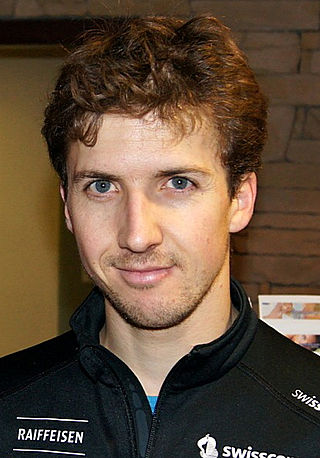
The 1994 Winter Olympics, officially known as the XVII Olympic Winter Games and commonly known as Lillehammer '94, were an international winter multi-sport event held from 12 to 27 February 1994 in and around Lillehammer, Norway. Having lost the bid for the 1992 Winter Olympics to Albertville in France, Lillehammer was awarded the 1994 Winter Games on 15 September 1988, two days before the 1988 Summer Olympics opening ceremonies at the 94th IOC Session in Seoul, South Korea. Due to the calendar changes made in 1986, this was the only time that the Winter Olympics took place two years after the previous Winter Games, and the first to be held in a different year from the Summer Olympics. This was also the first Winter Olympics to be held during the Commonwealth Games and FIFA World Cup year. This was the second Olympic Games of any type hosted in Norway — the first being the 1952 Winter Olympics in Oslo — and the fourth Olympics overall to be held in a Nordic country, after the 1912 Summer Olympics in Stockholm, Sweden, and the 1952 Summer Olympics in Helsinki, Finland. Lillehammer is the northernmost city ever to host the Olympic Games.

The 1984 Winter Olympics, officially known as the XIV Olympic Winter Games and commonly known as Sarajevo '84, were a winter multi-sport event held between 8 and 19 February 1984 in Sarajevo, Yugoslavia. It was the first Winter Olympic Games held in a Slavic language-speaking country, as well as the only Winter Olympics held in a communist country before the 2022 Winter Olympics in Beijing, China. It was the second consecutive Olympic Games held in a communist country, after the 1980 Summer Olympics in Moscow, Russian SFSR, Soviet Union.

The 1988 Winter Olympics, officially known as the XV Olympic Winter Games and commonly known as Calgary 1988, were a multi-sport event held from February 13 to 28, 1988, with Calgary, Alberta as the main host city. This marks the most recent time that two consecutive Olympic Games were hosted in North America. It was the first Winter Olympic Games to be held for 15 days, like the counterpart Summer Olympic Games. The majority of the events took place in Calgary itself. However, the snow events were shared by Nakiska ski resort in Kananaskis Country at the west of the city and the Canmore Nordic Centre Provincial Park in the town of Canmore.

The 1964 Winter Olympics, officially known as the IX Olympic Winter Games and commonly known as Innsbruck 1964, were a winter multi-sport event which was celebrated in Innsbruck, Austria, from January 29 to February 9, 1964. The city was already an Olympic candidate, unsuccessfully bidding to host the 1960 Games. Innsbruck won the 1964 Games bid, defeating the cities of Calgary in Canada and Lahti in Finland. The sports venues, many of which were built for the Games, were located within a radius of 20 km (12 mi) around Innsbruck. The Games included 1,091 athletes from 36 nations, which was a record for the Winter Games at the time. Athletes participated in six sports and ten disciplines which bring together a total of thirty-four official events, seven more than the 1960 Winter Olympic Games. The luge made its debut on the Olympic program. Three Asian nations made their Winter Games debut: North Korea, India and Mongolia.
1924 in sports describes the year's events in world sport.

Simon Ammann is a Swiss ski jumper. He is one of the most successful athletes in the history of the sport, having won four individual Winter Olympic gold medals in 2002 and 2010. His other achievements include winning the 2007 Ski Jumping World Championships, the 2010 Ski Flying World Championships, the 2010 Nordic Tournament, and the 2010 Ski Jumping World Cup overall title.

Matti Ensio Nykänen was a Finnish ski jumper who competed from 1981 to 1991. He is one of the most successful ski jumpers of all time, having won five Winter Olympic medals, nine World Championship medals, and 22 Finnish Championship medals. Most notably, he won three gold medals at the 1988 Winter Olympics, becoming, along with Yvonne van Gennip of the Netherlands, the most medaled athlete that winter.

Michael David Edwards, better known as Eddie the Eagle, is an English ski jumper and Olympian who in 1988 became the first competitor to represent Great Britain in Olympic ski jumping, finishing last in the Normal Hill and Large Hill events. He held the British ski jumping record from 1988 to 2001. He also took part in amateur speed skiing, running at 106.8 km/h (66.4 mph), and became a stunt jumping world record holder for jumping over 6 buses.
The 1988 Winter Olympics, officially known as the XV Olympic Winter Games, was a winter multi-sport event held in Calgary, Canada, from 13 to 28 February 1988. A total of 1,423 athletes representing 57 National Olympic Committees (NOCs) participated in 46 events from 10 different sports and disciplines. Five new events were contested at these Games—men's and women's Super G in alpine skiing, team events in Nordic combined and ski jumping, and women's 5000 metres in speed skating—and two events returned to the program—men's and women's combined in alpine skiing.

Janne Petteri Ahonen is a Finnish former ski jumper and drag racer. He competed in ski jumping between 1992 and 2018, and is one of the sport's most successful athletes of all time, as well as one of the most successful from Finland. Ahonen won two consecutive World Cup overall titles, the Four Hills Tournament a record five times, two individual gold medals at the World Championships, and the Nordic Tournament once. Nicknamed Kuningaskotka, he has been described as the greatest ski jumper to have never won an individual medal at the Winter Olympics.

Alpine skiing at the 1988 Winter Olympics consisted of ten alpine skiing events, held February 15–27 at Nakiska on Mount Allan, a new ski area west of Calgary.

Canada was the host nation for the 1988 Winter Olympics in Calgary. It was the first time that Canada had hosted the Winter Olympic Games, and second time overall, after the 1976 Summer Olympics in Montreal. Vancouver would eventually host the 2010 Winter Olympics which makes it the second city in Canada to host the Winter Olympics and the third overall.

The Union of Soviet Socialist Republics competed at the 1988 Winter Olympics in Calgary, Alberta, Canada. It would be the last Winter Olympic Games before the dissolution of the USSR in 1991. Six of the former Soviet republics would compete together as the Unified Team at the 1992 Winter Olympics, and each republic would be independently represented at subsequent Games.

France competed at the 1988 Winter Olympics in Calgary, Alberta, Canada. Frank Piccard won France's first Winter Olympic gold medal for 20 years.

Switzerland competed at the 1988 Winter Olympics in Calgary, Alberta, Canada.

Finland competed at the 1988 Winter Olympics in Calgary, Alberta, Canada.

West Germany competed at the Winter Olympic Games for the last time as a separate nation at the 1988 Winter Olympics in Calgary, Alberta, Canada. Following German reunification in 1990, a single German team would compete in the 1992 Winter Olympics.

Poland competed at the 1988 Winter Olympics in Calgary, Alberta, Canada.

Kamil Wiktor Stoch is a Polish ski jumper. He is one of the most successful ski jumpers in the history of the sport, having won two World Cup titles, three Four Hills Tournaments, three individual gold medals at the Winter Olympics, individual and team gold at the Ski Jumping World Championships, and individual silver at the Ski Flying World Championships. His other tournament wins include Raw Air (twice), the Willingen Five, and Planica7.

Eddie the Eagle is a 2015 biographical sports comedy-drama film directed by Dexter Fletcher. The film stars Taron Egerton as Michael Edwards, a British skier who in 1988 became the first competitor to represent Great Britain in Olympic ski jumping since 1928. Hugh Jackman, Christopher Walken, Iris Berben and Jim Broadbent co-star. The film had its first public screening at the Butt-Numb-A-Thon in Austin, Texas on December 12, 2015 and its world premiere at the 2016 Sundance Film Festival on January 26, 2016.



















